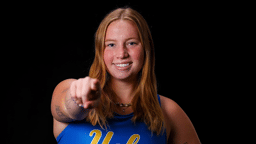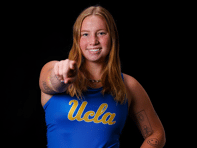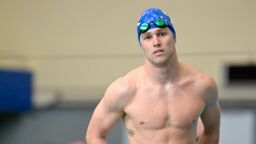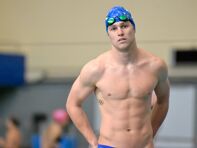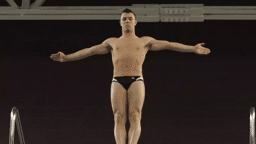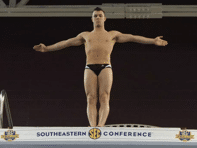“I came out to someone for the first time almost exactly 3 years ago today. The process since then has been long, scary, rewarding, and definitely worth it. Happy national coming out day!”
Those three sentences, posted along with a picture as an Instagram story on Oct. 11, 2020, marked the next big step in my coming out process. It meant that a lot more friends and extended family would know, and it was the first time I ever came out to my tennis teammates at Dartmouth.
While that post was short, it reflected exactly how I was feeling. I had become much more comfortable with my identity and ready to acknowledge it more openly, but I also didn’t feel the need to make a huge deal out of it or turn it into a big announcement.
Growing up in Rochester, New York, I was thrown into sports at a young age. I come from an athletic family where both of my parents and much of my extended family played college sports. I was the only one in the family who played tennis and I quickly fell in love with the sport and its individual nature.
When I first started playing tournaments, my parents had an idea of what they wanted me to be out on the court. They thought I should play with a lot of energy, be vocal and even throw in some trash talk now and again, similar to how they used to play on the basketball court.
They thought I should play an aggressive, serve-and-volley style like the pro players they used to watch on TV. Pretty soon, they began to realize that was not me at all. I preferred to stay at the baseline and hit groundstrokes, stay out of confrontation, and I played my best tennis when I remained calm and showed little emotion.
As I got older, my dad would always tell me to “be John” before going out to a match. He learned that the way for me to play my best and to have the best results was to be myself on the court and have confidence in that. I think that idea of being myself stuck with me as I started to realize I was gay.
I never wanted to try and act like another person or fake interest in things I wasn’t interested in, similar to how I wasn’t going to play a style of tennis that I didn’t like playing. In my mind, it was inevitable that I would come out, but like many others in the LGBTQ community, I was afraid of how the people in my life would react.
The first time I ever came out to someone was in October 2017. The process from that moment to coming out to my teammates took three years. My team at Dartmouth has always been really close. We spend a ton of time together and we all enjoy being around each other. That culture was always a big focus for us and our coaches.
We knew that during matches, we could count on everyone to battle until the end because we were playing for more than just ourselves. We routinely have meals, study in the library and hang out together over the weekends. While I loved having such a close team, I felt like they didn’t really know me. There was always a little bit of distance that I kept between us. I never actively tried to act straight or hide things, but I wasn’t forthcoming with the truth and I engaged in surface-level conversation.

There had been many times over those three years where I thought about coming out to them. I had planned to start with one and then gradually tell the rest. Over the summer of 2020, when we were all home due to the pandemic, I even typed out a message after yet another case in the Supreme Courts challenging LGBTQ+ rights, but I never sent it. I just couldn’t get over the fear that they might not be accepting or treat me differently. That fear was not new, it was something that I had been feeling for years and that prevented me from coming out sooner.
Over time, that fear followed me onto the court and had an impact on my tennis. Tennis is such a mental sport and confidence is everything. To be able to trust your game and shots in the big moments is critical, and when you’re doubting yourself and lacking confidence off the court, it’s easy to let that affect you on the court.
I definitely felt like I started to be impacted by nerves a lot more than I did when I was in the juniors and felt like I had forgotten what had made me successful over the years. It got to the point where I decided to see our sport’s psychologist at school to try and learn ways to combat the nerves and doubt that I was experiencing. I began to realize that the best thing for me might actually be to come out. I thought facing that fear would allow me to play with more freedom on the court.
Everything culminated with my Instagram story on National Coming Out Day. My coming out statement included a picture of my dad and me where I was wearing a Pride shirt.

I turned my phone off and started watching a show to distract myself. When I turned the phone back on, I saw messages from friends, extended family and some of my teammates, all with positive things to say. That moment was a huge weight off my shoulders. While I was proud of the progress I made, that fear didn’t completely go away. Even now, when I meet new people, there’s still that initial doubt over how they might react, but knowing that I have the support of my friends and family makes it easier each time.
Unfortunately, I never had the chance to see if coming out would have the positive impact I thought it might during matches. Due to the pandemic, all sports in the Ivy League were cancelled and I will not be using my additional years of eligibility after graduation.
While I was disappointed to never have the chance to play a college match as an openly gay athlete, coming out has certainly had a positive impact on other areas of my life. In the time that were able to practice as a team during the winter, I felt happier on the court and just in general. I no longer felt like my mood depended on how well I was playing or winning matches.
Overall, not much in my life has changed since coming out thanks to the positive reaction and support from everyone in my life. If anything, I feel like my relationships with friends and family have gotten stronger and I am able to live more authentically.
My goal in writing this is to continue to increase the visibility of gay athletes, especially in men’s tennis. The ATP tour has never had an out male player actively in the top 100 of the rankings and there are not many out tennis players in college tennis.
I’ve seen other stories of college tennis players on Outsports, and I think it’s important to increase the representation so that people at the upper levels of the sport will be able to come out and feel supported.
The individual nature of professional tennis makes it particularly challenging for players to come out. No one wants to be vulnerable and feel like they’re displaying any sort of weakness to the competition and you have no teammates to confide in.
As more tennis players come out and continue the conversation, hopefully that mindset will change, and we will see more representation in men’s tennis.
John Speicher, 22, will be graduating from Dartmouth College in June 2021. He is a senior on the men’s tennis team and pursuing a degree in Neuroscience. After graduation, he plans to work and gain clinical experience with the goal of going to physician assistant’s school. He can be reached by email ([email protected]) or Instagram (@John.Speicher).
Story editor: Jim Buzinski
If you are an out LGBTQ person in sports and want to tell your story, email Jim ([email protected])
Check out our archive of coming out stories.
If you’re an LGBTQ person in sports looking to connect with others in the community, head over to GO! Space to meet and interact with other LGBTQ athletes, or to Equality Coaching Alliance to find other coaches, administrators and other non-athletes in sports.







